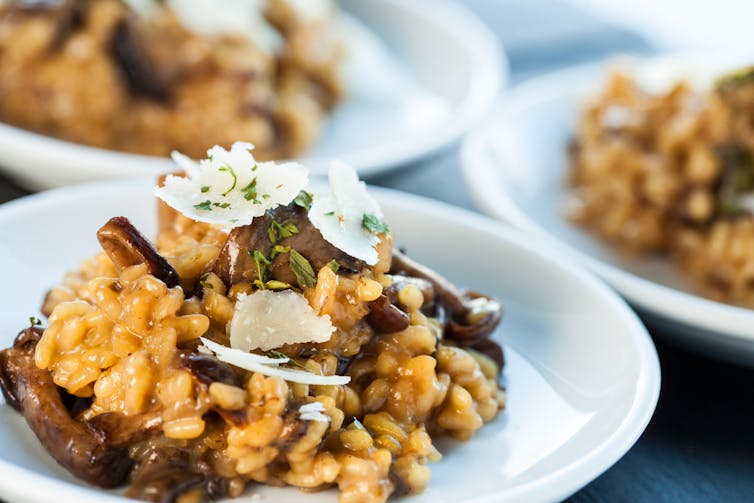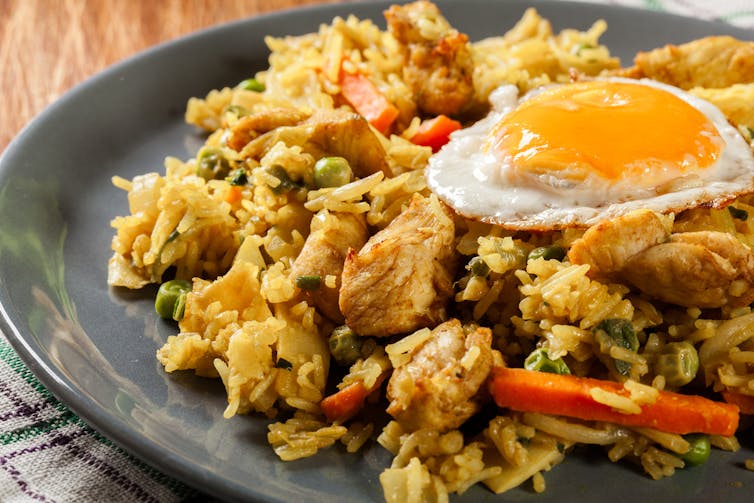Rice is a staple meals for billions of individuals in Asia and Africa. It’s additionally a flexible ingredient for a lot of iconic dishes from all over the world, together with dolmades from Greece, risottos from Italy, paella from Spain and rice puddings from the UK.
Regardless of its common enchantment, the query requested in each kitchen, be it an expert one or your personal dwelling, is whether or not you must pre-wash (or rinse) your rice earlier than cooking.
What do cooks and cooks say?
Culinary specialists declare pre-washing rice reduces the quantity of starch coming from the rice grains. You’ll be able to see this within the cloudy rinse water, which research have proven to be the free starch (amylose) on the floor of the rice grain produced by the milling course of.
In culinary circles, washing is advocated for some dishes when a separated grain is wanted. But for different dishes reminiscent of risottos, paella and rice puddings (the place you want a sticky, creamy impact), washing is prevented.
Different components, reminiscent of the kind of rice, household custom, native well being warnings and even the perceived effort and time required will affect whether or not folks pre-wash their rice.

Shutterstock
Is there proof that washing rice makes it much less sticky?
A latest research in contrast the impact of washing on the stickiness and hardness of three various kinds of rice from the identical provider. The three sorts have been glutinous rice, medium grain rice and jasmine rice. These totally different rices have been both not washed in any respect, washed 3 times with water, or washed ten instances with water.
Opposite to what cooks will inform you, this research confirmed the washing course of had no impact on the stickiness (or hardness) of the rice.
As a substitute, the researchers demonstrated the stickiness was not because of the floor starch (amylose), however fairly a unique starch referred to as amylopectin that’s leached out of the rice grain throughout the cooking course of. The quantity leached differed between the sorts of rice grains.
So, it’s the number of rice – fairly than washing – that’s crucial to the stickiness. On this research, glutinous rice was the stickiest, whereas medium grain rice and jasmine rice have been much less sticky, and in addition tougher as examined within the laboratory. (Hardness is consultant of the textures related to biting and chewing.)

Shutterstock
You should still wish to wash your rice, although
Historically rice was washed to rinse off mud, bugs, little stones and bits of husk left from the rice hulling course of. This will likely nonetheless be necessary for some areas of the world the place the processing isn’t as meticulous, and will present peace of thoughts for others.
Extra lately, with the heavy use of plastics within the meals provide chain, microplastics have been present in our meals, together with rice. The washing course of has been proven to rinse as much as 20% of the plastics from raw rice.
This identical research discovered that regardless of the packaging (plastic or paper baggage) you purchase rice in, it accommodates the identical stage of microplastics. The researchers additionally confirmed plastics in (pre-cooked) immediate rice have been discovered to be fourfold larger than in raw rice. If you happen to pre-rinse immediate rice, you may scale back plastics by 40%.
À lire aussi :
You are consuming microplastics in methods you do not even realise
Rice can be recognized to include comparatively excessive ranges of arsenic, because of the crop absorbing extra arsenic because it grows. Washing rice has been proven to take away about 90% of bio-accessible arsenic, nevertheless it additionally rinses out a considerable amount of different vitamins necessary for our well being, together with copper, iron, zinc and vanadium.
For some folks, rice affords a small share of their every day consumption of those vitamins and therefore can have a small influence on their well being. However for populations that eat massive quantities of closely washed rice every day, it may influence their general diet.
One other research checked out different heavy metals, lead and cadmium, along with arsenic; it discovered that pre-washing decreased ranges of all these from between 7–20%. The World Well being Group has warned of the chance of arsenic publicity from water and meals.
Arsenic ranges in rice differ relying on the place it’s grown, the cultivars of rice and the methods it’s cooked. The most effective recommendation stays to pre-wash your rice and make sure you eat a wide range of grains. Probably the most latest research in 2005 discovered that the best stage of arsenic was in the US. Nonetheless it is very important take into account that arsenic is current in different meals together with merchandise constructed from rice (truffles, crackers, biscuits and cereals), seaweed, seafood and greens.
À lire aussi :
Excessive ranges of cancer-causing arsenic in rice – so why isn’t it regulated in our meals?
Can washing rice stop micro organism?
In brief, no. Washing rice can have no impact on the bacterial content material of the cooked rice, as excessive cooking temperatures will kill all micro organism current.
What’s extra regarding is how lengthy you retailer cooked rice or washed rice at room temperature. Cooking rice doesn’t kill the bacterial spores from a pathogen referred to as Bacillus cereus.
If moist rice or cooked rice is saved at room temperature, this could activate the bacterial spores they usually start to develop. These micro organism then produce toxins which cannot be deactivated by cooking or re-heating; these toxins could cause extreme gastrointestinal illness. So, be sure to keep away from preserving washed or cooked rice at room temperature for too lengthy.

